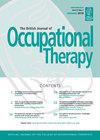Psychometric evaluation and feasibility of the Persian-Relative Mastery Scale in the caregivers
IF 1.3
4区 医学
Q3 REHABILITATION
引用次数: 0
Abstract
Purpose:This study aimed to evaluate the validity, reliability, and feasibility of the Persian version of the Relative Mastery Scale as a measure of the Occupational Adaptation Model in caregivers of people with multiple sclerosis.Method:In a cross-sectional study, after translation, face and content validity, the caregivers completed the Relative Mastery Scale and the Canadian Occupational Performance Measure. Expanded Disability Status Scale for people with multiple sclerosis was reported by neurologist. Also, convergent validity, internal consistency, test–retest reliability, and exploratory factor analyses were evaluated.Results:A total of 150 caregivers completed both instruments. Cronbach’s α = 0.852 and ICC = 0.838 were good. The convergent validity of the total Relative Mastery Scale score was confirmed with a significant correlation with Canadian Occupational Performance Measure ( r > 0.67, p < 0.001) and Expanded Disability Status Scale score ( r > 0.34, p < 0.001). The Persian-Relative Mastery Scale was found as a multidimensional instrument with three items that appeared to be redundant.Conclusion:The Persian-Relative Mastery Scale had acceptable reliability and validity for evaluating mastery in Persian-speaker caregivers.波斯语相对掌握量表在护理人员中的心理计量评估和可行性研究
目的:本研究旨在评估波斯语版相对掌握量表作为多发性硬化症患者护理人员职业适应模型测量方法的有效性、可靠性和可行性。方法:在一项横断面研究中,经过翻译、面效和内容效度验证后,护理人员完成了相对掌握量表和加拿大职业表现测量法。神经科医生报告了多发性硬化症患者残疾状况扩展量表。结果:共有 150 名护理人员完成了这两份问卷。Cronbach'sα=0.852,ICC=0.838,结果良好。相对掌握量表的总分与加拿大职业表现测量(Canadian Occupational Performance Measure)(r > 0.67, p < 0.001)和残疾状况扩展量表(Expanded Disability Status Scale)(r > 0.34, p < 0.001)具有显著的相关性,这证实了相对掌握量表的收敛效度。结论:波斯语相对掌握量表在评估波斯语护理人员的掌握情况方面具有可接受的信度和效度。
本文章由计算机程序翻译,如有差异,请以英文原文为准。
求助全文
约1分钟内获得全文
求助全文
来源期刊

British Journal of Occupational Therapy
REHABILITATION-
CiteScore
2.20
自引率
15.40%
发文量
81
审稿时长
6-12 weeks
期刊介绍:
British Journal of Occupational Therapy (BJOT) is the official journal of the Royal College of Occupational Therapists. Its purpose is to publish articles with international relevance that advance knowledge in research, practice, education, and management in occupational therapy. It is a monthly peer reviewed publication that disseminates evidence on the effectiveness, benefit, and value of occupational therapy so that occupational therapists, service users, and key stakeholders can make informed decisions. BJOT publishes research articles, reviews, practice analyses, opinion pieces, editorials, letters to the editor and book reviews. It also regularly publishes special issues on topics relevant to occupational therapy.
 求助内容:
求助内容: 应助结果提醒方式:
应助结果提醒方式:


